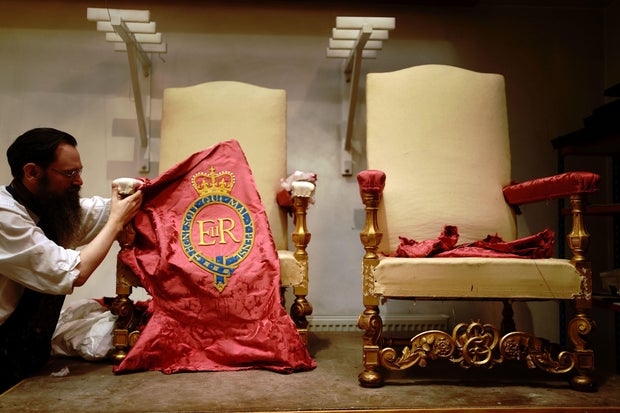Over the weekend, Buckingham Palace revealed the various thrones that King Charles III and his wife, Queen Consort Camilla, will use during their formal coronation ceremony on May 6. According to the woman in charge of sprucing it up, one of them is “the oldest surviving piece of furniture still used for its original purpose, so it’s incredibly rare.”
Krista Blessley, Paintings Conservator at Westminster Abbey in London, worked for weeks before the coronation to restore the incredibly fragile “Coronation Chair,” also known as St. Edwards Chair.

The Coronation Chair’s role
The six-and-a-half-foot-tall Baltic oak throne, built in 1309, has “been used for every coronation of an English monarch, with a few exceptions, since then,” according to Blessley. She stated that a large portion of the renovation work consisted of “sticking those layers of gilding back down and making sure it’s completely sound before the coronation.”
Buckingham Palace said St Edward’s Chair would be used, as it has been for centuries, for the “moment of crowning” on Saturday.
Coronation Chair’s recycled companions
During the ancient ceremony, Charles and Camilla, who will lose the “Consort” from her title and become simply Queen Camilla upon her crowning, will use several other chairs.
The couple will sit in the “Chairs of Estate” and two “Throne Chairs” during the rest of the service, according to the palace.
“In the interests of sustainability, Their Majesties have chosen to use Chairs of Estate and Throne Chairs from the Royal Collection made for previous Coronations,” the palace said in a statement on Sunday, adding that the chairs “have also been conserved, restored, and adapted as required.”

The late Queen Elizabeth II, Charles’ mother, used the Coronation Chair for her coronation ceremony in 1953. The world was watching in black and white back then, so Blessley wanted to make sure the thrones’ colors shone through this year.
A contemporary crowning achievement
“There are birds, figures of saints and kings,” she said of the elaborate and intricate decorations on the prized antique. “It really is an exquisite example of the kind of craftsmanship that doesn’t survive anymore.”
The Coronation Chair has survived graffiti from schoolchildren and tourists in the 18th and 19th centuries, as well as a bomb attack in 1914 blamed on suffragettes campaigning for women’s suffrage.
The restoration of the Coronation Chair, according to Blessley, would be her “crowning achievement.”
“I’m going to feel proud that I worked on the chair on the day of the coronation,” she told CBS News. “I’m going to feel relieved when it’s over and everything is still where it should be. It’s an exciting time and it’s a real privilege to be a part of it.”


